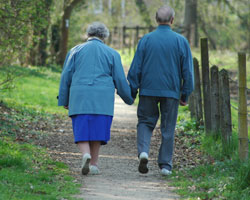‘Full Circle…an Aging Expo’ April 22 in WaKeeney
The educational event is for seniors and their families, as well as professionals who work in the aging industry. Released: March 22, 2016
Released: March 22, 2016
WAKEENEY, Kan. – We’ve all been there. Perhaps we look up a phone number, then go to dial the number and can’t remember the digits. Maybe we’ve been in a conversation with another person and have a “tip of the tongue” moment when the right word seems difficult to find. Or, we’ve lost our car keys or other items and had to retrace our steps to find them.
Throughout life, every person experiences situations that involve memory loss, but we tend to focus on it more when we’re older, said Andy Crocker, gerontology and health program specialist with the Texas A&M AgriLife Extension Service.
“A lot of times we want to lump things into aging, and it’s easy for us to talk about ‘normal’ or ‘natural’ memory loss,” Crocker said. “I like to talk about things that may be common. Some memory impairment may be common as we grow older, but we have little slips all throughout our lives.”
Crocker is the featured speaker for the “Full Circle...an Aging Expo” on Friday, April 22 at the WaKeeney United Methodist Church, 500 Summit Ave., WaKeeney, Kansas. Although Crocker will not be at the event in person, he will deliver the program, titled “Master of Memory,” live via an online Zoom videoconference.
The goal of the program is not to provide a “miracle cure” for memory loss, but rather to look critically at memory and dispel negative stereotypes associated with a slippage in memory, he said. Take into account not remembering a phone number right after looking it up. It’s probably not because the memory is failing, but most likely the person didn’t take the time to internalize the number.
“We need to look at what else is going on,” Crocker said. “Did I learn the information to begin with? Was I distracted? Am I getting caught up in some negative spiral of emotions that’s causing me to be down on myself, which also may impact my ability to learn and remember new things?”
Crocker said one of the things he notices is that older people tend to automatically conclude the worst – Alzheimer’s disease – when they experience a little bit of forgetfulness, and it frightens them. However, it isn’t always the worst, and there are strategies that can help people remember.
“Make a note. There’s no problem with writing things down. There’s no problem with trying to come up with some kind of association. There’s no problem with prioritizing, paying attention and concentrating on something you are trying to learn or remember,” he said.
The annual “Full Circle...an Aging Expo” will have two tracks: a professional track that will begin with registration at 8:45 a.m., and program from 9:15 a.m. to 5:15 p.m., focused on “best care practices” for seniors and designed to meet the needs of those working in the aging industry; and a public track that will begin with registration at 10 a.m., and program from 10:30 a.m. to 3:15 p.m., for seniors and their families. Crocker’s presentation is part of the lunch that will involve both tracks. The remainder of the program is different for each track.
The professional track, a joint project of K-State Research and Extension and the Northwest Kansas Area Agency on Aging, will include topics such as nutrition in seniors, connecting dentistry to overall systemic health, sleep disorders that affect an aging population, managing chronic pain with physical therapy and specialty wound care. The intent is to provide professionals with tools they can implement in their work and allow time for networking.
The professional track costs $85 per person for all sessions and lunch. Those wanting to come for the morning session only can do so for $60 per person; likewise, the afternoon session only is $60. The morning and afternoon sessions do not include lunch. Late registration, after April 12, is an additional $20 for the full day and $10 for a half-day session.
The public track will include two live sessions: sleeping well to improve overall health, and sexual and intimate relationships in seniors. The registration fee will allow participants to access follow-up online Zoom videoconference sessions on four additional topics that include resizing your home, Alzheimer’s 101, Medicare and fall prevention.
Cost for the public track is $30 per person or $50 for two people and includes lunch. Registration at the door is $35 per person and does not guarantee a lunch.
For brochures to both tracks and registration information, go online to the K-State Research and Extension Northwest Area Office website. For information about other 2016 regional expos in Kansas that are focused on aging, visit Regional Aging Expos 2016.
-30-
K-State Research and Extension is a short name for the Kansas State University Agricultural Experiment Station and Cooperative Extension Service, a program designed to generate and distribute useful knowledge for the well-being of Kansans. Supported by county, state, federal and private funds, the program has county Extension offices, experiment fields, area Extension offices and regional research centers statewide. Its headquarters is on the K-State campus, Manhattan.
Story by:
Katie Allen
K-State Research and Extension
katielynn@ksu.edu
785-532-1162
For more information:
Northwest Area Extension Office, 785-462-6281
Melinda Daily, Sunflower Extension District, 785-852-4285 or mdaily@ksu.edu
Anna Muir, Phillips-Rooks District, 785-425-6851 or amuir@ksu.edu
